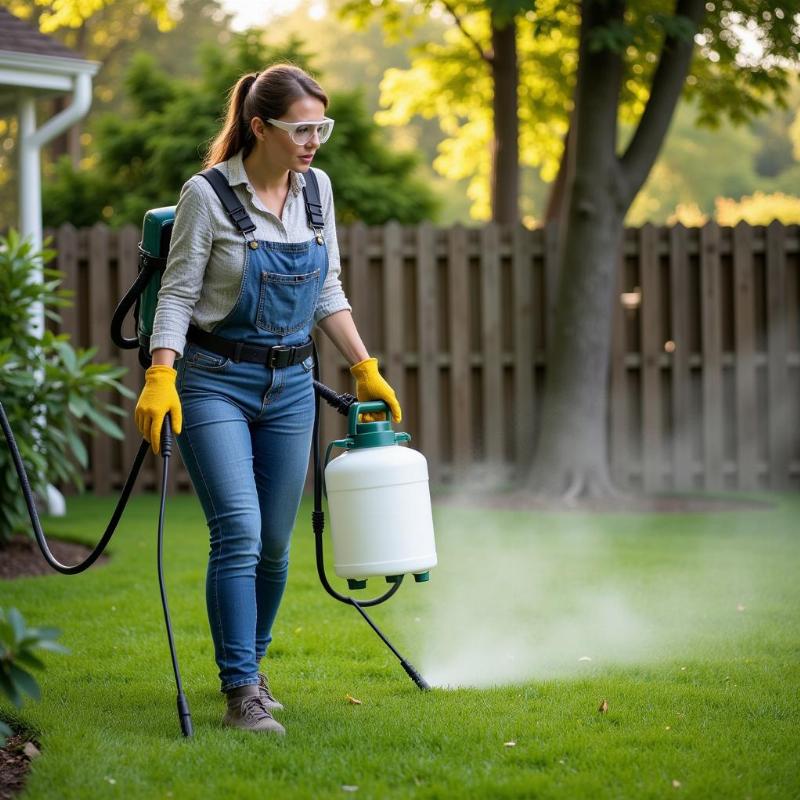Dog grass allergies can be a real nuisance for both you and your furry friend. Itchy skin, constant licking, and watery eyes are just a few of the symptoms that can make your dog miserable. This guide will cover everything you need to know about how to treat dog grass allergies, from identifying the allergens to providing effective relief and prevention strategies. Let’s help your dog enjoy the outdoors again!
Understanding Dog Grass Allergies
While we often refer to it as a “grass allergy,” dogs are typically reacting to pollen and other microscopic organisms that live in the grass, rather than the grass itself. These allergens get trapped in their fur and paws, leading to various allergic reactions. Symptoms can range from mild skin irritation to more severe respiratory issues. It’s important to note that some dogs may also be allergic to certain types of grasses more than others.
Identifying the Allergens
Identifying the specific allergens causing your dog’s discomfort is the first step towards effective treatment. While observing your dog’s behavior in grassy areas can provide clues, allergy testing performed by a veterinarian is the most reliable method. These tests can pinpoint the exact culprits, enabling a targeted treatment plan.
Treating Dog Grass Allergies: Effective Strategies
Several treatment options are available for dog grass allergies, ranging from at-home remedies to veterinary interventions.
At-Home Remedies
- Regular Bathing: Frequent baths with a hypoallergenic shampoo can help remove allergens from your dog’s coat and skin. instinct dog food freeze dried can also help to maintain a healthy coat and skin.
- Paw Cleaning: Wipe your dog’s paws with a damp cloth after walks to remove pollen and other irritants.
- Omega-3 Fatty Acids: These supplements can help reduce inflammation and improve skin health.
Veterinary Treatments
- Antihistamines: These medications can help alleviate itching and other allergy symptoms. anti scratch spray for dogs can be used in conjunction with oral antihistamines.
- Corticosteroids: For more severe cases, your vet may prescribe corticosteroids to reduce inflammation.
- Immunotherapy (Allergy Shots): This long-term treatment involves gradually exposing your dog to increasing amounts of the allergen to desensitize their immune system. swimmer’s ear for dogs can sometimes be confused with allergies, so a proper diagnosis is important.
Preventing Dog Grass Allergies: Proactive Measures
Prevention is always better than cure. Here are some proactive measures you can take:
- Limit Grass Exposure: Avoid walking your dog in areas with tall grass, especially during peak pollen seasons.
- Maintain a Healthy Lawn: Keep your lawn mowed short to minimize pollen production.
- Boost Your Dog’s Immune System: A healthy diet and regular exercise can strengthen your dog’s immune system, making them less susceptible to allergies. my dogs foot is swollen can be a sign of allergies or other issues, so it’s important to monitor your dog’s paws closely.
 Preventing Grass Allergies in Dogs
Preventing Grass Allergies in Dogs
Conclusion
Dealing with dog grass allergies requires a multi-faceted approach. By identifying the allergens, implementing effective treatment strategies, and adopting preventative measures, you can significantly improve your dog’s quality of life and help them enjoy the great outdoors without discomfort. Remember to consult with your veterinarian for a personalized treatment plan tailored to your dog’s specific needs. How to treat dog grass allergies effectively depends on the individual dog, so professional guidance is essential.
FAQ
- How can I tell if my dog is allergic to grass? Common signs include itching, redness, excessive licking, chewing on paws, sneezing, and watery eyes.
- What is the best treatment for dog grass allergies? The best treatment varies depending on the severity of the allergy. Consult with your veterinarian for an accurate diagnosis and personalized treatment plan.
- Are there any home remedies for dog grass allergies? Regular bathing, paw cleaning, and omega-3 fatty acid supplements can help manage symptoms.
- Can dog grass allergies be cured? While there’s no cure, allergies can be effectively managed with appropriate treatment and preventative measures.
- Is it safe to use human antihistamines on dogs? No, never give your dog human medication without consulting your veterinarian.
- How effective is immunotherapy for dog grass allergies? Immunotherapy can be highly effective for some dogs, but it requires a long-term commitment.
- Can my dog develop a grass allergy later in life? Yes, dogs can develop allergies at any age. dog spray for potty training can be helpful for training, but be mindful of any potential allergic reactions to the spray itself.
Beautdogs.us is your premier online destination for all things dog-related in the USA. We provide expert advice on dog breeds, care, and product reviews to help you provide the best possible care for your canine companion. Whether you’re a seasoned dog owner or just starting out, Beautdogs.us is your trusted source for reliable information. Contact us today for any inquiries: Email: [email protected], Phone: +1 501-555-7529.